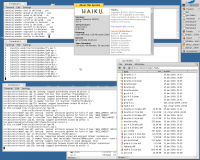We are pleased to announce that Google has allotted us with six students for this year's Summer of Code program! This is quite an achievement, seeing as how Google accepted only 1000 students, which is about 10% less than in 2008. As with the year before, the quality of the proposals submitted by students has increased significantly. This year, students who applied to Haiku were suggested to fix an issue in our bug tracker. This provided our mentors with a glimpse into the students' programming ability, as well as their ambition. Those contributions, several of which have already been committed to our SVN repository, proved to be a valuable resource when ranking the students. This allowed our mentors to strike a balance between projects that fill a need in Haiku and projects by students who have also shown themselves to be a worthy Google Summer of Code student. These students went above and beyond our requirements and expectations. They gave us hope that come October, November, and beyond, they will still be making contributions to our community. Since retaining students as community developers is one of the goals of Summer of Code, it weighed heavily in our decision. Without further ado, here is the list of students who will be sponsored by Google to contribute to Haiku in Google's Summer of Code 2009:
Haiku GSoC 2009 flier (pdf & hi res PNG) Haiku's application for Google Summer of Code 2009™ has been accepted!
This year, the role of Haiku's Google Summer of Code primary administrator has been taken up by Matt Madia, with Stephan Aßmus acting as the backup administrator. Over the past few days, Google program administrators evaluated a total of 395 Mentoring organization applications and published their list of those accepted on Wednesday, March 18th 19:00 UTC.
If you happen to be visiting the Chemnitzer Linux-Tage conference on March 14-15, 2009, make sure to stop by the Haiku booth and say "Hi!". Attending this year on behalf of Haiku will be Stephan Aßmus, Axel Dörfler, Denise Wein and Daniel Wünsch.
The Haiku booth is next to the one of the Fedora Linux project, together with many other open source operating systems like FreeBSD, Ubuntu, openSUSE, NetBSD, OpenBSD, etc.
This Saturday, the 28th of February, the software that powers the website, Drupal and 47 (!) modules, have been upgraded to the Drupal 5 platform. This upgrade creates the foundation to continue to improve the functionality and information on our website, as the demands change, also in the face of the upcoming Alpha 1 release.
While the upgrade team has concluded that most of the data migrated smoothly, there are some rough edges.
 Michael's Quad-core compiling GCC4.3.3
Michael's Quad-core compiling GCC4.3.3
As many Haiku community members know, one major hurdle that has been making it difficult to port new software to Haiku has been the lack of an up-to-date GCC4 compiler. While a GCC 4.1.2 cross-compiler has been available now for some time, cross-compiling software for a GCC4-built Haiku can be painful and frustrating. What Haiku really needed was a native GCC4 toolchain to run on a GCC4-built Haiku install.
That time is now! A native Haiku GCC4.3.3 is now a reality.
Michael Lotz set out to tackle this task and the fruits of his labor have finally been committed to the Haiku repository for all to benefit from.
On behalf of Haiku, we'd like to wish everyone Happy Holidays!
While the news may seem a little slow lately (people are likely busy during the holiday season), there has indeed been a few things happening of note.
One exciting announcement was from Christof Lutteroth letting us know that some final-year projects from the University of Auckland were prototyped using Haiku. While these prototypes and the code behind them are not yet publicly available, they have generously offered to donate this code to Haiku in the future.
At the end of the month, the main user mailing list openbeos@freelists.org will finally be renamed to haiku@freelists.org, removing the most apparent reference to our previous name, OpenBeOS, that our project had until summer of 2004. The old archive will remain accessible, and all subscribers will be moved to the new list automatically. We'll even send you a reminder when it's done, so that you'll remember to send future mails to haiku@freelists.org instead.
Stephan Aßmus asked me if I'd like to translate my article on BeGeistert 019
https://haiku-gazette.blogspot.com/2008/10/das-war-begeistert-019.html to English. How could I refuse? :) Here it is:
BeGeistert 019 was held last weekend in Düsseldorf and was, as far as I can tell, a great success. I've been to BeGeistert twice in the past (I think 2002 and 2003) and in my opinion the spirit of BeGeistert hasn't changed since then. Maybe there used to be some more non-coders among the guests and the focus was more on applications; that was of course because Haiku was still in its OpenBeOS nappies at that time...
We're very glad that Haiku has been part of Google's Summer of Code this year again. We were granted five student projects to improve Haiku. But since we had so many good and worthwhile project proposals, we set out to start our very own Haiku Code Drive. We asked for your help in the form of donations, and we were absolutely overwhelmed by the response we got from you, our community: we were able to sponsor 4 more student projects to work on Haiku.
Yes, of course, you know all of that already. The reason for this review is that, since both coding events are officially over by now, I wanted to give you an overview of what has happened, and how the students fared. Not all projects have been success stories, but we were lucky to have found some very talented students this year. We're glad we had you!





